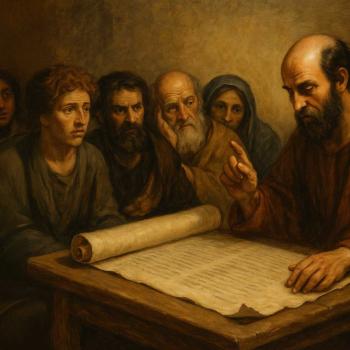The Gospel of John is my favorite book in the Bible. Although I’m no expert on literature, I believe it is the most masterfully-crafted text I have ever read. But it has been greatly misunderstood, both as to its historical reliability and its identification of who Jesus is.
In the nineteenth and twentieth centuries, major New Testament scholars dismissed the Gospel of John as having no historical credibility. This even included my friend Jimmy Dunn (James D. G. Dunn). They therefore regarded the Johannine Jesus as a fictional character. Their objection started with the fact that the first three gospels of the New Testament are similar summaries of the life of Jesus, often relating same pericopes; but they contended the Fourth Gospel, the Gospel of John, is so different from them and seems to portray Jesus as God that it must be inauthentic and therefore not present the historical Jesus. They have claimed that the Johannine Jesus is too rhetorical for reality. They also asserted that because Jesus is presented as God in the Gospel of John, this advanced theology reflects the later church’s developed christology and therefore not that of the real Jesus.
But such sentiment has been changing recently among Johannine scholars. They generally now affirm the historical reliability of the Gospel of John. Yet they remain divided as to whether or not it says Jesus is God. In my book, The Restitution of Jesus Christ, published in 2008, I defend the historical authenticity of the Gospel of John and show meticulously in this gospel how it does not say Jesus is God.
A somewhat new book, actually a large monograph, by Johannine scholar James H. Charlesworth also affirms the historical reliability of the Gospel of John. It is entitled Jesus as Mirrored in John: The Genius in the New Testament (2019). His Chapter 5 is entitled “John: A Neglected Source,” and his Chapter 6 is entitled “Archaeological Discoveries Supporting the Historicity of John’s Traditions.” Charlesworth is also an archaeologist and expert on the Dead Sea Scrolls. The latter contain pre-Christian writings that are strikingly similar to the Gospel of John. In Charlesworth’s book, he shows at length how archaeological discoveries have been going on which affirm the historical reliability of Gospel of John even more than the synoptics. He states (p. 155), “archaeologists are frequently able to prove John’s historical accuracy.” He presents several discoveries that have done this.
Readers of the Gospel of John are familiar with how the Johannine Jesus so often spoke symbolically and figuratively, more so than how he is presented in the synoptics. Charlesworth states (p. 199), “Johannine symbolism is not created exclusively to serve rhetoric; it is intermittently grounded in history” as archaeology has been proving. And in John, Jesus said to his disciples at the close of the Last Supper–right before Jesus was arrested, tried, and crucified–“I have said these things to you in figures of speech. The hour is coming when I will no longer speak to you in figures, but tell you plainly of the Father.’ . . . His disciples said, ‘Yes, now you are speaking plainly, not in any figure of speech! . . . we believe that you came from God'” (John 16.25, 29-30).
That is the main theme of the Gospel of John, that Jesus came from God and was sent from God, not that Jesus is God. The Johannine Jesus said it himself many times. But he never said he was God, either in the Gospel of John or the synoptics. Thus, in my, I hope, humble opinion, and with no disrespect for scholars who are far more educated than I, many distinguished scholars in the last two centuries got off on the wrong foot by assuming that the Gospel of John is historically unreliable partly because they wrongly believed it presents Jesus as God.


















